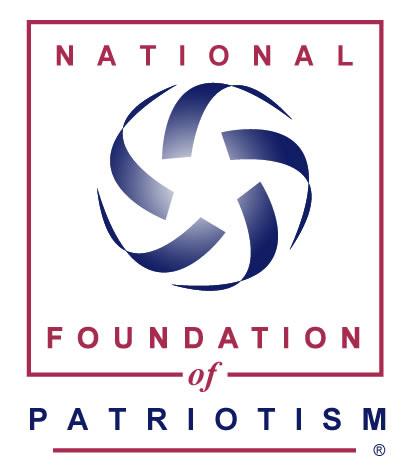National Foundation of Patriotism Medal of Honor recipient advisory board members.
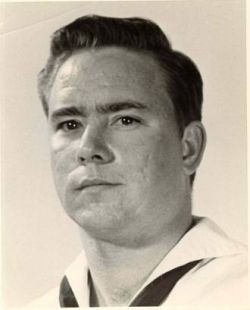
Ballard, Donald E
Corporal, U.S. Army (Ret.)
For conspicuous gallantry and intrepidity at the risk of his life and beyond the call of duty while serving as a HC2c. with Company M, in connection with operations against enemy aggressor forces. During the afternoon hours, Company M was moving to join the remainder of the 3d Battalion in Quang Tri Province. After treating and evacuating 2 heat casualties, HC2c. Ballard was returning to his platoon from the evacuation landing zone when the company was ambushed by a North Vietnamese Army unit employing automatic weapons and mortars, and sustained numerous casualties. Observing a wounded marine, HC2c. Ballard unhesitatingly moved across the fire swept terrain to the injured man and swiftly rendered medical assistance to his comrade. HC2c. Ballard then directed 4 marines to carry the casualty to a position of relative safety. As the 4 men prepared to move the wounded marine, an enemy soldier suddenly left his concealed position and, after hurling a hand grenade which landed near the casualty, commenced firing upon the small group of men. Instantly shouting a warning to the marines, HC2c. Ballard fearlessly threw himself upon the lethal explosive device to protect his comrades from the deadly blast. When the grenade failed to detonate, he calmly arose from his dangerous position and resolutely continued his determined efforts in treating other marine casualties. HC2c. Ballard’s heroic actions and selfless concern for the welfare of his companions served to inspire all who observed him and prevented possible injury or death to his fellow marines. His courage, daring initiative, and unwavering devotion to duty in the face of extreme personal danger, sustain and enhance the finest traditions of the U.S. Naval Service.
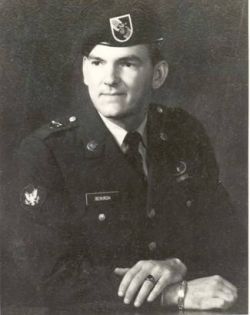
Beikirch, Gary B
Sergent, U.S. Army (Ret.)
For conspicuous gallantry and intrepidity in action at the risk of his life above and beyond the call of duty. Sgt. Beikirch, medical aidman, Detachment B-24, Company B, distinguished himself during the defense of Camp Dak Seang. The allied defenders suffered a number of casualties as a result of an intense, devastating attack launched by the enemy from well-concealed positions surrounding the camp. Sgt. Beikirch, with complete disregard for his personal safety, moved unhesitatingly through the withering enemy fire to his fallen comrades, applied first aid to their wounds and assisted them to the medical aid station. When informed that a seriously injured American officer was lying in an exposed position, Sgt. Beikirch ran immediately through the hail of fire. Although he was wounded seriously by fragments from an exploding enemy mortar shell, Sgt. Beikirch carried the officer to a medical aid station. Ignoring his own serious injuries, Sgt. Beikirch left the relative safety of the medical bunker to search for and evacuate other men who had been injured. He was again wounded as he dragged a critically injured Vietnamese soldier to the medical bunker while simultaneously applying mouth-to-mouth resuscitation to sustain his life. Sgt. Beikirch again refused treatment and continued his search for other casualties until he collapsed. Only then did he permit himself to be treated. Sgt. Beikirch’s complete devotion to the welfare of his comrades, at the risk of his life are in keeping with the highest traditions of the military service and reflect great credit on him, his unit, and the U.S. Army.
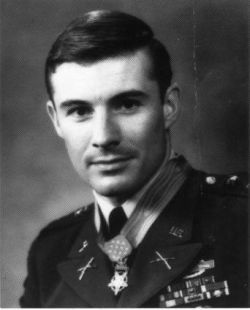
Bucha, Paul William
Captain, U.S. Army (Ret.)
For conspicuous gallantry and intrepidity in action at the risk of his life above and beyond the call of duty. Capt. Bucha distinguished himself while serving as commanding officer, Company D, on a reconnaissance-in-force mission against enemy forces near Phuoc Vinh, The company was inserted by helicopter into the suspected enemy stronghold to locate and destroy the enemy. During this period Capt. Bucha aggressively and courageously led his men in the destruction of enemy fortifications and base areas and eliminated scattered resistance impeding the advance of the company. On 18 March while advancing to contact, the lead elements of the company became engaged by the heavy automatic weapon, heavy machine gun, rocket propelled grenade, Claymore mine and small-arms fire of an estimated battalion-size force. Capt. Bucha, with complete disregard for his safety, moved to the threatened area to direct the defense and ordered reinforcements to the aid of the lead element. Seeing that his men were pinned down by heavy machine gun fire from a concealed bunker located some 40 meters to the front of the positions, Capt. Bucha crawled through the hail of fire to single-handedly destroy the bunker with grenades. During this heroic action Capt. Bucha received a painful shrapnel wound. Returning to the perimeter, he observed that his unit could not hold its positions and repel the human wave assaults launched by the determined enemy. Capt. Bucha ordered the withdrawal of the unit elements and covered the withdrawal to positions of a company perimeter from which he could direct fire upon the charging enemy. When 1 friendly element retrieving casualties was ambushed and cut off from the perimeter, Capt. Bucha ordered them to feign death and he directed artillery fire around them. During the night Capt. Bucha moved throughout the position, distributing ammunition, providing encouragement and insuring the integrity of the defense. He directed artillery, helicopter gunship and Air Force gunship fire on the enemy strong points and attacking forces, marking the positions with smoke grenades. Using flashlights in complete view of enemy snipers, he directed the medical evacuation of 3 air-ambulance loads of seriously wounded personnel and the helicopter supply of his company. At daybreak Capt. Bucha led a rescue party to recover the dead and wounded members of the ambushed element. During the period of intensive combat, Capt. Bucha, by his extraordinary heroism, inspirational example, outstanding leadership and professional competence, led his company in the decimation of a superior enemy force which left 156 dead on the battlefield. His bravery and gallantry at the risk of his life are in the highest traditions of the military service, Capt. Bucha has reflected great credit on himself, his unit, and the U.S. Army.
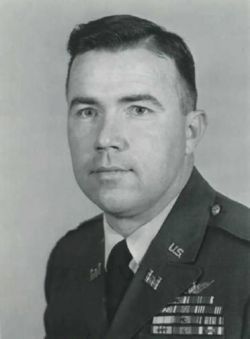
Crandall, Bruce P
Major, U.S. Army (Ret.)
For conspicuous gallantry and intrepidity at the risk of his life above and beyond the call of duty: Major Bruce P. Crandall distinguished himself by extraordinary heroism as a Flight Commander in the Republic of Vietnam, while serving with Company A, 229th Assault Helicopter Battalion, 1st Cavalry Division (Airmobile). On 14 November 1965, his flight of sixteen helicopters was lifting troops for a search and destroy mission from Plei Me, Vietnam, to Landing Zone X-Ray in the Ia Drang Valley. On the fourth troop lift, the airlift began to take enemy fire, and by the time the aircraft had refueled and returned for the next troop lift, the enemy had Landing Zone X-Ray targeted. As Major Crandall and the first eight helicopters landed to discharge troops on his fifth troop lift, his unarmed helicopter came under such intense enemy fire that the ground commander ordered the second flight of eight aircraft to abort their mission. As Major Crandall flew back to Plei Me, his base of operations, he determined that the ground commander of the besieged infantry battalion desperately needed more ammunition. Major Crandall then decided to adjust his base of operations to Artillery Firebase Falcon in order to shorten the flight distance to deliver ammunition and evacuate wounded soldiers. While medical evacuation was not his mission, he immediately sought volunteers and with complete disregard for his own personal safety, led the two aircraft to Landing Zone X-Ray. Despite the fact that the landing zone was still under relentless enemy fire, Major Crandall landed and proceeded to supervise the loading of seriously wounded soldiers aboard his aircraft. Major Crandall’s voluntary decision to land under the most extreme fire instilled in the other pilots the will and spirit to continue to land their own aircraft, and in the ground forces the realization that they would be resupplied and that friendly wounded would be promptly evacuated. This greatly enhanced morale and the will to fight at a critical time. After his first medical evacuation, Major Crandall continued to fly into and out of the landing zone throughout the day and into the evening. That day he completed a total of 22 flights, most under intense enemy fire, retiring from the battlefield only after all possible service had been rendered to the Infantry battalion. His actions provided critical resupply of ammunition and evacuation of the wounded. Major Crandall’s daring acts of bravery and courage in the face of an overwhelming and determined enemy are in keeping with the highest traditions of the military service and reflect great credit upon himself, his unit, and the United States Army.
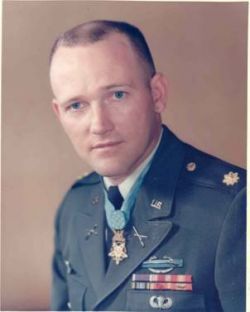
Donlon, Roger Hugh
Colonel, U.S. Army (Ret.)
For conspicuous gallantry and intrepidity at the risk of his life above and beyond the call of duty while defending a U.S. military installation against a fierce attack by hostile forces. Capt. Donlon was serving as the commanding officer of the U.S. Army Special Forces Detachment A-726 at Camp Nam Dong when a reinforced Viet Cong battalion suddenly launched a full-scale, predawn attack on the camp. During the violent battle that ensued, lasting 5 hours and resulting in heavy casualties on both sides, Capt. Donlon directed the defense operations in the midst of an enemy barrage of mortar shells, falling grenades, and extremely heavy gunfire. Upon the initial onslaught, he swiftly marshaled his forces and ordered the removal of the needed ammunition from a blazing building. He then dashed through a hail of small arms and exploding hand grenades to abort a breach of the main gate. En route to this position he detected an enemy demolition team of 3 in the proximity of the main gate and quickly annihilated them. Although exposed to the intense grenade attack, he then succeeded in reaching a 60mm mortar position despite sustaining a severe stomach wound as he was within 5 yards of the gun pit. When he discovered that most of the men in this gunpit were also wounded, he completely disregarded his own injury, directed their withdrawal to a location 30 meters away, and again risked his life by remaining behind and covering the movement with the utmost effectiveness. Noticing that his team sergeant was unable to evacuate the gun pit he crawled toward him and, while dragging the fallen soldier out of the gunpit, an enemy mortar exploded and inflicted a wound in Capt. Donlon’s left shoulder. Although suffering from multiple wounds, he carried the abandoned 60mm mortar weapon to a new location 30 meters away where he found 3 wounded defenders. After administering first aid and encouragement to these men, he left the weapon with them, headed toward another position, and retrieved a 57mm recoilless rifle. Then with great courage and coolness under fire, he returned to the abandoned gun pit, evacuated ammunition for the 2 weapons, and while crawling and dragging the urgently needed ammunition, received a third wound on his leg by an enemy hand grenade. Despite his critical physical condition, he again crawled 175 meters to an 81mm mortar position and directed firing operations which protected the seriously threatened east sector of the camp. He then moved to an eastern 60mm mortar position and upon determining that the vicious enemy assault had weakened, crawled back to the gun pit with the 60mm mortar, set it up for defensive operations, and turned it over to 2 defenders with minor wounds. Without hesitation, he left this sheltered position, and moved from position to position around the beleaguered perimeter while hurling hand grenades at the enemy and inspiring his men to superhuman effort. As he bravely continued to move around the perimeter, a mortar shell exploded, wounding him in the face and body. As the long awaited daylight brought defeat to the enemy forces and their retreat back to the jungle leaving behind 54 of their dead, many weapons, and grenades, Capt. Donlon immediately reorganized his defenses and administered first aid to the wounded. His dynamic leadership, fortitude, and valiant efforts inspired not only the American personnel but the friendly Vietnamese defenders as well and resulted in the successful defense of the camp. Capt. Donlon’s extraordinary heroism, at the risk of his life above and beyond the call of duty are in the highest traditions of the U.S. Army and reflect great credit upon himself and the Armed Forces of his country.
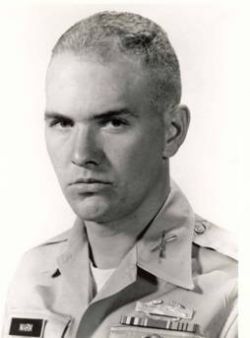
Marm, Walter Joseph
Colonel, U.S. Army (Ret.)
For conspicuous gallantry and intrepidity at the risk of life above and beyond the call of duty. As a platoon leader in the 1st Cavalry Division (Airmobile), 1st Lt. Marm demonstrated indomitable courage during a combat operation. His company was moving through the valley to relieve a friendly unit surrounded by an enemy force of estimated regimental size. 1st Lt. Marm led his platoon through withering fire until they were finally forced to take cover. Realizing that his platoon could not hold very long, and seeing four enemy soldiers moving into his position, he moved quickly under heavy fire and annihilated all 4. Then, seeing that his platoon was receiving intense fire from a concealed machine gun, he deliberately exposed himself to draw its fire. Thus locating its position, he attempted to destroy it with an antitank weapon. Although he inflicted casualties, the weapon did not silence the enemy fire. Quickly, disregarding the intense fire directed on him and his platoon, he charged 30 meters across open ground, and hurled grenades into the enemy position, killing some of the 8 insurgents manning it. Although severely wounded, when his grenades were expended, armed with only a rifle, he continued the momentum of his assault on the position and killed the remainder. His selfless actions reduced the fire on his platoon, broke the enemy assault, and rallied his unit to continue toward the accomplishment of this mission. 1st Lt. Marm’s gallantry on the battlefield and his extraordinary intrepidity at the risk of his life are in the highest traditions of the U.S. Army and reflect great credit upon himself and the Armed Forces of his country.
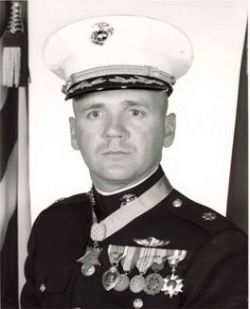
Modrzejewski, Robert J
Colonel, USMC (Ret.)
For conspicuous gallantry and intrepidity at the risk of his life above and beyond the call of duty. On 15 July, during Operation HASTINGS, Company K was landed in an enemy-infested jungle area to establish a blocking position at a major enemy trail network. Shortly after landing, the company encountered a reinforced enemy platoon in a well-organized, defensive position. Maj. Modrzejewski led his men in the successful seizure of the enemy redoubt, which contained large quantities of ammunition and supplies. That evening, a numerically superior enemy force counterattacked in an effort to retake the vital supply area, thus setting the pattern of activity for the next 2 1/2 days. In the first series of attacks, the enemy assaulted repeatedly in overwhelming numbers but each time was repulsed by the gallant marines. The second night, the enemy struck in battalion strength, and Maj. Modrzejewski was wounded in this intensive action which was fought at close quarters. Although exposed to enemy fire, and despite his painful wounds, he crawled 200 meters to provide critically needed ammunition to an exposed element of his command and was constantly present wherever the fighting was heaviest, despite numerous casualties, a dwindling supply of ammunition and the knowledge that they were surrounded, he skillfully directed artillery fire to within a few meter* of his position and courageously inspired the efforts of his company in repelling the aggressive enemy attack. On 18 July, Company K was attacked by a regimental-size enemy force. Although his unit was vastly outnumbered and weakened by the previous fighting, Maj. Modrzejewski reorganized his men and calmly moved among them to encourage and direct their efforts to heroic limits as they fought to overcome the vicious enemy onslaught. Again he called in air and artillery strikes at close range with devastating effect on the enemy, which together with the bold and determined fighting of the men of Company K, repulsed the fanatical attack of the larger North Vietnamese force. His unparalleled personal heroism and indomitable leadership inspired his men to a significant victory over the enemy force and reflected great credit upon himself, the Marine Corps, and the U.S. Naval Service.
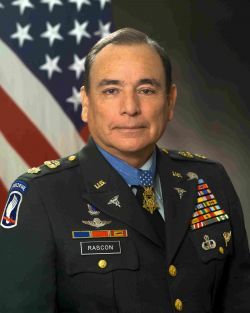
Rascon, Alfred V
Lieutenant Colonel, U.S. Army (Ret.)
Specialist Four Alfred Rascon, distinguished himself by a series of extraordinarily courageous acts on 16 March 1966, while assigned as a medic to the Reconnaissance Platoon, Headquarters Company, 1st Battalion (Airborne), 503rd Infantry, 173d Airborne Brigade (Separate). While moving to reinforce its sister battalion under intense enemy attack, the Reconnaissance Platoon came under heavy fire from a numerically superior enemy force. The intense enemy fire from crew-served weapons and grenades severely wounded several point squad soldiers. Specialist Rascon, ignoring directions to stay behind shelter until covering fire could be provided, made his way forward. He repeatedly tried to reach the severely wounded point machine-gunner laying on an open enemy trail, but was driven back each time by the withering fire. Disregarding his personal safety, he jumped to his feet, ignoring flying bullets and exploding grenades to reach his comrade. To protect him from further wounds, he intentionally placed his body between the soldier and enemy machine guns, sustaining numerous shrapnel injuries and a serious wound to the hip. Disregarding his serious wounds he dragged the larger soldier from the fire-raked trail. Hearing the second machine-gunner yell that he was running out of ammunition, Specialist Rascon, under heavy enemy fire crawled back to the wounded machine-gunner stripping him of his bandoleers of ammunition, giving them to the machine-gunner who continued his suppressive fire. Specialist Rascon fearing the abandoned machine gun, its ammunition and spare barrel could fall into enemy hands made his way to retrieve them. On the way, he was wounded in the face and torso by grenade fragments, but disregarded these wounds to recover the abandoned machine gun, ammunition and spare barrel items, enabling another soldier to provide added suppressive fire to the pinned-down squad. In searching for the wounded, he saw the point grenadier being wounded by small arms fire and grenades being thrown at him. Disregarding his own life and his numerous wounds, Specialist Rascon reached and covered him with his body absorbing the blasts from the exploding grenades, and saving the soldier’s life, but sustaining additional wounds to his body. While making his way to the wounded point squad leader, grenades were hurled at the sergeant. Again, in complete disregard for his own life, he reached and covered the sergeant with his body, absorbing the full force of the grenade explosions. Once more Specialist Rascon was critically wounded by shrapnel, but disregarded his own wounds to continue to search and aid the wounded. Severely wounded, he remained on the battlefield, inspiring his fellow soldiers to continue the battle. After the enemy broke contact, he disregarded aid for himself, instead treating the wounded and directing their evacuation. Only after being placed on the evacuation helicopter did he allow aid to be given to him. Specialist Rascon’s extraordinary valor in the face of deadly enemy fire, his heroism in rescuing the wounded, and his gallantry by repeatedly risking his own life for his fellow soldiers are in keeping with the highest traditions of military service and reflect great credit upon himself, his unit, and the United States Army.
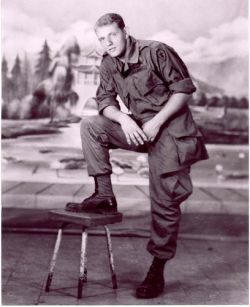
Stumpf, Kenneth E
Staff Sergent, U.S. Army (Ret.)
For conspicuous gallantry and intrepidity in action at risk of his life above and beyond the call of duty. S/Sgt. Stumpf distinguished himself while serving as a squad leader of the 3d Platoon, Company C, on a search and destroy mission. As S/Sgt. Stumpf’s company approached a village, it encountered a North Vietnamese rifle company occupying a well fortified bunker complex. During the initial contact, 3 men from his squad fell wounded in front of a hostile machinegun emplacement. The enemy’s heavy volume of fire prevented the unit from moving to the aid of the injured men, but S/Sgt. Stumpf left his secure position in a deep trench and ran through the barrage of incoming rounds to reach his wounded comrades. He picked up 1 of the men and carried him back to the safety of the trench. Twice more S/Sgt. Stumpf dashed forward while the enemy turned automatic weapons and machineguns upon him, yet he managed to rescue the remaining 2 wounded squad members. He then organized his squad and led an assault against several enemy bunkers from which continuously heavy fire was being received. He and his squad successfully eliminated 2 of the bunker positions, but one to the front of the advancing platoon remained a serious threat. Arming himself with extra handgrenades, S/Sgt. Stumpf ran over open ground, through a volley of fire directed at him by a determined enemy, toward the machinegun position. As he reached the bunker, he threw a handgrenade through the aperture. It was immediately returned by the occupants, forcing S/Sgt. Stumpf to take cover. Undaunted, he pulled the pins on 2 more grenades, held them for a few seconds after activation, then hurled them into the position, this time successfully destroying the emplacement. With the elimination of this key position, his unit was able to assault and overrun the enemy. S/Sgt. Stumpf’s relentless spirit of aggressiveness, intrepidity, and ultimate concern for the lives of his men, are in the highest traditions of the military service and reflect great credit upon himself and the U.S. Army.
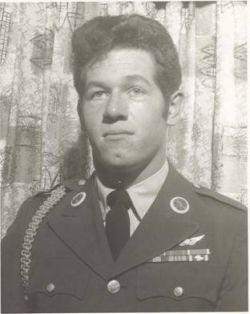
Wetzel, Gary George
Specialist 4th Class, U.S. Army (Ret.)
Sp4c. Wetzel, 173d Assault Helicopter Company, distinguished himself by conspicuous gallantry and intrepidity at the risk of his life. above and beyond the call of duty. Sp4c. Wetzel was serving as door gunner aboard a helicopter which was part of an insertion force trapped in a landing zone by intense and deadly hostile fire. Sp4c. Wetzel was going to the aid of his aircraft commander when he was blown into a rice paddy and critically wounded by 2 enemy rockets that exploded just inches from his location. Although bleeding profusely due to the loss of his left arm and severe wounds in his right arm, chest, and left leg, Sp4c. Wetzel staggered back to his original position in his gun-well and took the enemy forces under fire. His machinegun was the only weapon placing effective fire on the enemy at that time. Through a resolve that overcame the shock and intolerable pain of his injuries, Sp4c. Wetzel remained at his position until he had eliminated the automatic weapons emplacement that had been inflicting heavy casualties on the American troops and preventing them from moving against this strong enemy force. Refusing to attend his own extensive wounds, he attempted to return to the aid of his aircraft commander but passed out from loss of blood. Regaining consciousness, he persisted in his efforts to drag himself to the aid of his fellow crewman. After an agonizing effort, he came to the side of the crew chief who was attempting to drag the wounded aircraft commander to the safety of a nearby dike. Unswerving in his devotion to his fellow man, Sp4c. Wetzel assisted his crew chief even though he lost consciousness once again during this action. Sp4c. Wetzel displayed extraordinary heroism in his efforts to aid his fellow crewmen. His gallant actions were in keeping with the highest traditions of the U.S. Army and reflect great credit upon himself and the Armed Forces of his country.
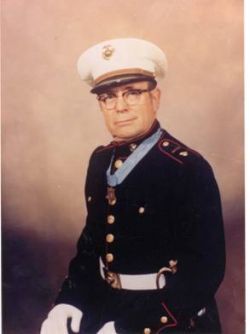
Williams, Hershel Woodrow
Corporal, USMC (Ret.)
For conspicuous gallantry and intrepidity at the risk of his life above and beyond the call of duty as demolition sergeant serving with the 21st Marines, 3d Marine Division, in action against enemy Japanese forces on Iwo Jima, Volcano Islands, 23 February 1945. Quick to volunteer his services when our tanks were maneuvering vainly to open a lane for the infantry through the network of reinforced concrete pillboxes, buried mines, and black volcanic sands, Cpl. Williams daringly went forward alone to attempt the reduction of devastating machinegun fire from the unyielding positions. Covered only by 4 riflemen, he fought desperately for 4 hours under terrific enemy small-arms fire and repeatedly returned to his own lines to prepare demolition charges and obtain serviced flamethrowers, struggling back, frequently to the rear of hostile emplacements, to wipe out 1 position after another. On 1 occasion, he daringly mounted a pillbox to insert the nozzle of his flamethrower through the air vent, killing the occupants and silencing the gun; on another he grimly charged enemy riflemen who attempted to stop him with bayonets and destroyed them with a burst of flame from his weapon. His unyielding determination and extraordinary heroism in the face of ruthless enemy resistance were directly instrumental in neutralizing one of the most fanatically defended Japanese strong points encountered by his regiment and aided vitally in enabling his company to reach its objective. Cpl. Williams’ aggressive fighting spirit and valiant devotion to duty throughout this fiercely contested action sustain and enhance the highest traditions of the U.S. Naval Service.
In memory of former National Foundation of Patriotism advisory board members
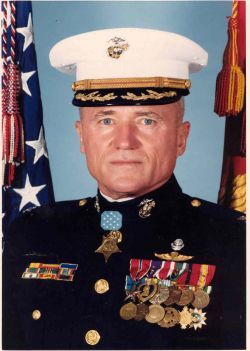
Fox, Wesley L
Captain, U.S. Army (Ret.)
For conspicuous gallantry and intrepidity at the risk of his life above and beyond the call of duty while serving as commanding officer of Company A, in action against the enemy in the northern A Shau Valley. Capt. (then 1st Lt.) Fox’s company came under intense fire from a large well concealed enemy force. Capt. Fox maneuvered to a position from which he could assess the situation and confer with his platoon leaders. As they departed to execute the plan he had devised, the enemy attacked and Capt. Fox was wounded along with all of the other members of the command group, except the executive officer. Capt. Fox continued to direct the activity of his company. Advancing through heavy enemy fire, he personally neutralized 1 enemy position and calmly ordered an assault against the hostile emplacements. He then moved through the hazardous area coordinating aircraft support with the activities of his men. When his executive officer was mortally wounded, Capt. Fox reorganized the company and directed the fire of his men as they hurled grenades against the enemy and drove the hostile forces into retreat. Wounded again in the final assault, Capt. Fox refused medical attention, established a defensive posture, and supervised the preparation of casualties for medical evacuation. His indomitable courage, inspiring initiative, and unwavering devotion to duty in the face of grave personal danger inspired his marines to such aggressive action that they overcame all enemy resistance and destroyed a large bunker complex. Capt. Fox’s heroic actions reflect great credit upon himself and the Marine Corps, and uphold the highest traditions of the U.S. Naval Service.
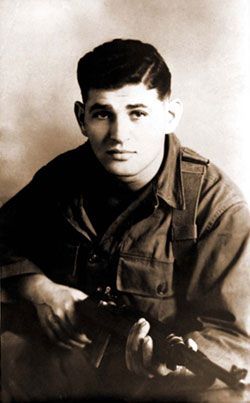
Rubin, Tibor
Corporal, U.S. Army (Ret.)
Corporal Tibor Rubin distinguished himself by extraordinary heroism during the period from July 23, 1950, to April 20, 1953, while serving as a rifleman with Company I, 8th Cavalry Regiment, 1st Cavalry Division in the Republic of Korea. While his unit was retreating to the Pusan Perimeter, Corporal Rubin was assigned to stay behind to keep open the vital Taegu-Pusan Road link used by his withdrawing unit. During the ensuing battle, overwhelming numbers of North Korean troops assaulted a hill defended solely by Corporal Rubin. He inflicted a staggering number of casualties on the attacking force during his personal 24-hour battle, single-handedly slowing the enemy advance and allowing the 8th Cavalry Regiment to complete its withdrawal successfully. Following the breakout from the Pusan Perimeter, the 8th Cavalry Regiment proceeded northward and advanced into North Korea. During the advance, he helped capture several hundred North Korean soldiers. On October 30, 1950, Chinese forces attacked his unit at Unsan, North Korea, during a massive nighttime assault. That night and throughout the next day, he manned a .30 caliber machine gun at the south end of the unit’s line after three previous gunners became casualties. He continued to man his machine gun until his ammunition was exhausted. His determined stand slowed the pace of the enemy advance in his sector, permitting the remnants of his unit to retreat southward. As the battle raged, Corporal Rubin was severely wounded and captured by the Chinese. Choosing to remain in the prison camp despite offers from the Chinese to return him to his native Hungary, Corporal Rubin disregarded his own personal safety and immediately began sneaking out of the camp at night in search of food for his comrades. Breaking into enemy food storehouses and gardens, he risked certain torture or death if caught. Corporal Rubin provided not only food to the starving Soldiers, but also desperately needed medical care and moral support for the sick and wounded of the POW camp. His brave, selfless efforts were directly attributed to saving the lives of as many as forty of his fellow prisoners. Corporal Rubin’s gallant actions in close contact with the enemy and unyielding courage and bravery while a prisoner of war are in the highest traditions of military service and reflect great credit upon himself and the United States Army.


